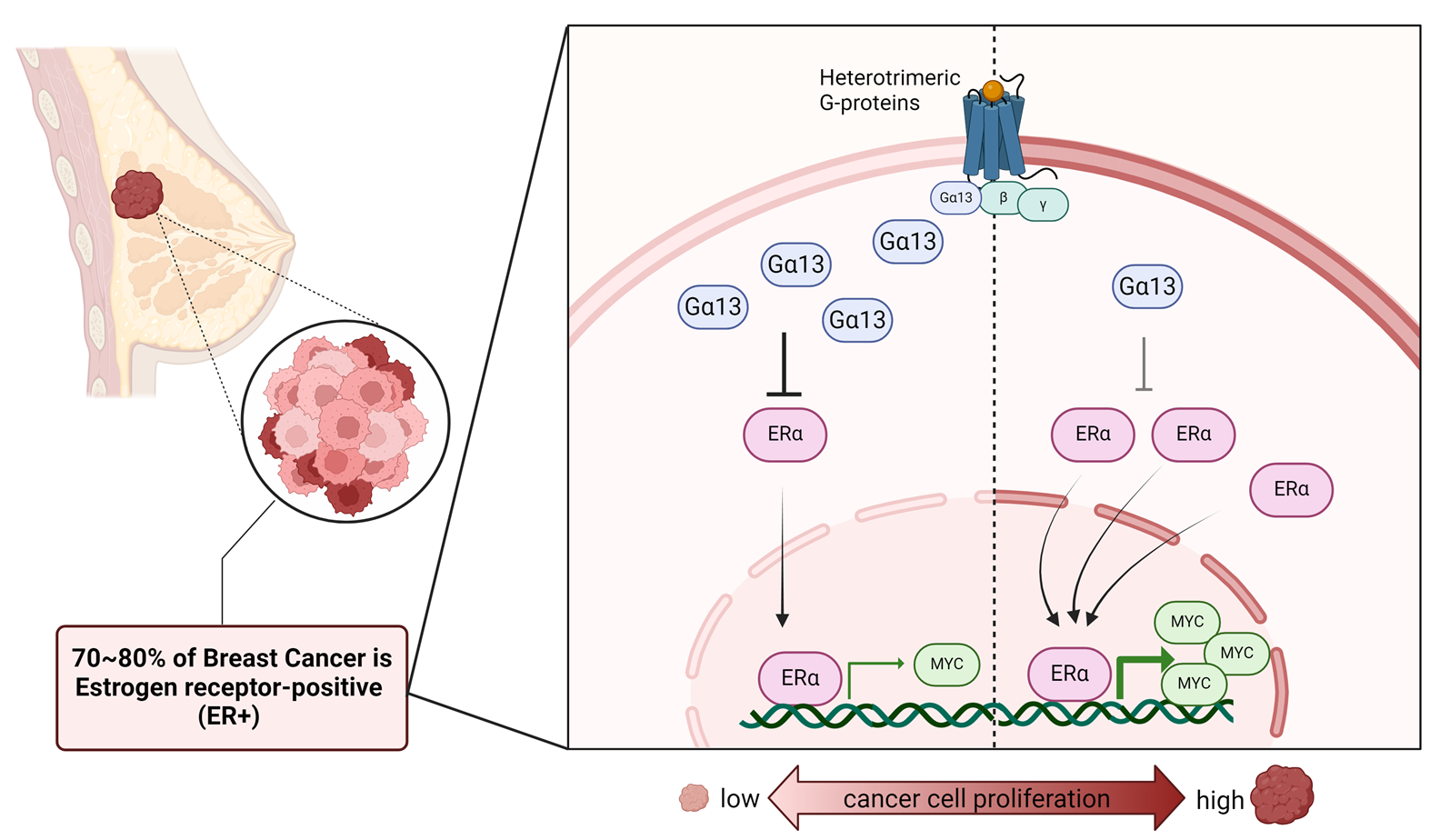Back
Monday, 26 Aug, 2024
Key discovery by Duke-NUS advances fight to reduce breast cancer recurrence
The surprising discovery that cellular protein Gα13 may actually protect against—rather than promote growth of—the most commonly relapsing type of breast cancer signals potential for more effective and innovative treatments.
Singapore, 26 August 2024 — In looking for new ways to fight breast cancer, scientists from Duke-NUS Medical School have unmasked a surprising role of a protein generally associated with cancer growth. They have discovered that in oestrogen receptor-positive (ER+) breast cancer, this protein acts as a tumour suppressor instead. ER+ breast cancer constitutes about 80 per cent of all breast cancer diagnoses, yet nearly 50 per cent of women diagnosed with it experience a relapse after initial treatment.

Loss of Gα13 in ER+ breast cancer cells leads to increased cell growth and tumour development, suggesting that Gα13 may suppress tumours in this subtype of cancer. (Credit: Illustration by Liao Pei-Ju, Duke-NUS Medical School, created with BioRender.com)
The unexpected finding counters long-held views that the protein, known as Gα13, acts as an accelerator of cancer cell growth, as seen with similar G-proteins. This latest discovery, published in the influential journal Breast Cancer Research, is the first study to identify Gα13 as a tumour suppressor in solid tumours. This could lead to new personalised approaches to breast cancer treatment involving examining levels of Gα13 and other proteins.
Dr Lalitha Subramanyan, a PhD graduate from Duke-NUS (Class of 2024) and now a postdoctoral fellow at Duke University’s Department of Pharmacology and Cancer Biology, who is the first author of the paper, said:
“Our findings challenge the previous notion that Gα13 universally promotes cancer growth across different tumour types. Instead, we found evidence suggesting that Gα13 may help disrupt harmful pathways in oestrogen receptor-positive breast cancer, potentially slowing or stopping the growth of cancer cells. This makes the discovery of a protective role of Gα13 even more significant, as it addresses a critical gap in understanding how different molecular pathways contribute to cancer progression.”
The study’s findings hold implications for a new direction in treatment strategies. Associate Professor Yap Yoon Sim, Department of Breast & Gynaecological Medical Oncology of National Cancer Centre Singapore, who was not involved in the research, opined:
“It is interesting that the effects of the GNA13 protein differ in different types of breast cancer cells. These findings highlight the complexity of cancer biology and the need to understand the role of different molecules and pathways in various settings. It is hoped that this knowledge can facilitate the development of novel strategies to treat breast cancer in the near future.”
Despite various advances in treatment, breast cancer remains the most diagnosed cancer worldwide and is a leading cause of cancer-related death in women, causing roughly 685,000 deaths in 2020.[1] In Singapore, breast cancer is the most commonly occurring cancer among women, accounting for almost one in three cancer diagnoses in women, according to the Singapore Cancer Society.[2] This highlights the profound impact of the disease on women’s health, as well as the urgent need for more effective treatments.
Breast cancer is a complex disease, comprising varying types that respond differently to treatments. The treatment approach varies depending on the molecular subtype.
Gα13 acts as a messenger within cells, transporting signals from the cell surface to inside of the cell, activating a cascade of reactions that influence the cell’s behaviour, including how it grows, divides, and responds to its environment. The study’s findings reveal a previously unknown connection between Gα13 signalling and that of the hormone oestrogen, an important determinant in breast cancer. Together, they control a prominent oncogene, MYC, and cancer cell growth.
Associate Professor Mei Wang from Duke-NUS’ Cancer and Stem Cell Biology Programme and co-corresponding author of the study, commented:
“Apart from expanding our understanding of Gα13 and related proteins in cancer formation, our findings also offer a fresh perspective on targeting recurrent ER+ cancers. While treatments for ER+ breast cancers primarily target ER signalling, nearly half of these patients develop resistance to such therapy over time. The discovery of Gα13 control of oestrogen signalling, and of MYC function, offers new ways to counter resistant ER+ breast cancers.”
During the study, a correlation between lower levels of Gα13 and poorer patient survival outcomes in ER+ breast cancer patients was also observed, further supporting the protective role of Gα13 against ER+ breast cancer.
The researchers plan to expand their study to explore Gα13’s role in other hormone-sensitive cancers, and by applying these principles to other solid cancers.
Professor Patrick Tan, Senior Vice-Dean for Research at Duke-NUS, commented:
“This study marks a defined and significant advance, with potential implications for cancer treatment strategies. Understanding these molecular mechanisms paves the way for targeted drug development, which could enhance the efficacy of breast cancer treatments and ultimately improve survival rates and quality of life for those affected by this devastating disease.”
Duke-NUS is a biomedical research powerhouse, committed to improving lives by combining basic scientific research with translational know-how to bring a better understanding to common diseases and develop new treatment approaches.
Reference: Lalitha Vaishnavi Subramanyan, Suhail Ahmed Kabeer Rasheed, Lijin Wang, Sujoy Ghosh, Michelle Shi Ning Ong, Manikandan Lakshmanan, Mei Wang and Patrick J Casey. GNA13 suppresses proliferation of ER+ breast cancer cells via ERα dependent upregulation of the MYC oncogene. Breast Cancer Research 2024. DOI: 10.1186/s13058-024-01866-x
For media enquires, pls contact Duke-NUS Communications.
[1] Source: https://www.ncbi.nlm.nih.gov/pmc/articles/PMC9465273